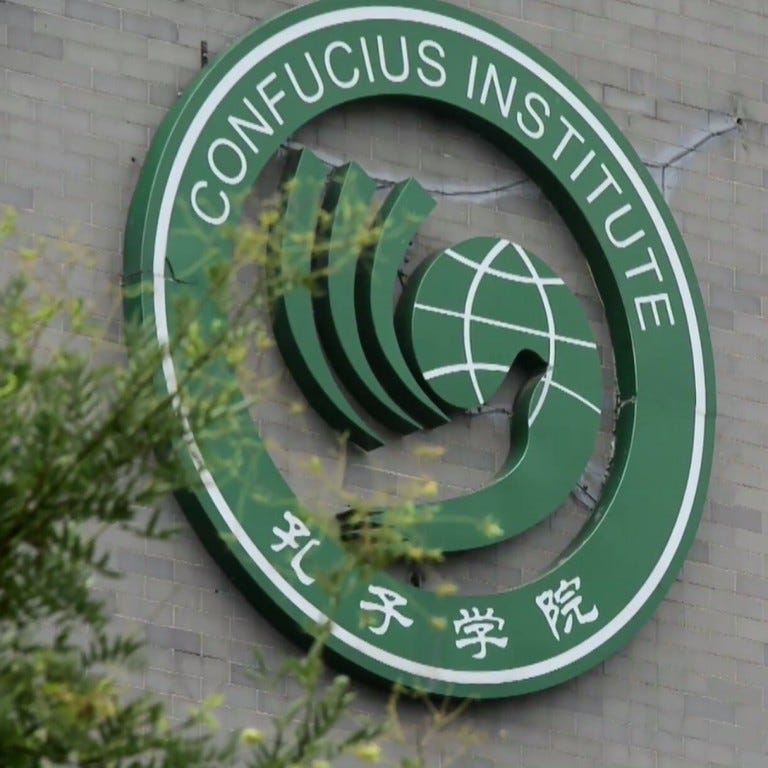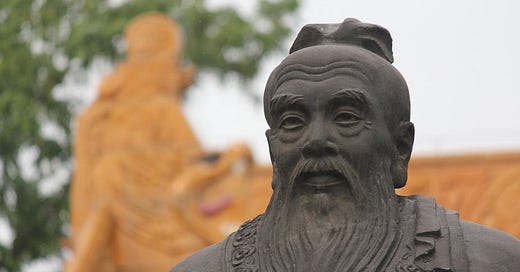Dear all
To what degree do traditional values and political ideology explain China’s economic, foreign, and security policies? As the West struggles to understand what China wants, it is a question that many are increasingly asking themselves.
In the course of the last few months of these newsletters we have established how important history is to understanding what China is doing today: how it reacts, why is reacts as it does, and what it ultimately wants. Getting to grips with the country’s values and ideologies are also vital to this, and there’s no more important ideology than Confuciasim.
(A quick note on terminology before we start. I’ve called Confucianism an ideology, but others think of it more as a philosophy, or even a religion. I’m going with “ideology” because I think it’s a more neutral term - but feel free to disagree on the comments.)
Many thanks for reading.
***
As might be expected with a country of nearly 1.4 billion people, it’s not possible to create a definitive list of “Chinese values”. Nor is it possible to say that there is one unifying ideology that blankets the land, despite the best efforts of the Communist Party.
Instead there are a number of ideologies which underpin Chinese society. Two of the most important to get to grips with in order to understand China today are Confucianism and Legalism.
We looked at Legalism with the rise of the Qin, the westernmost state of the Warring States Period (475BC-221BC) who, like the contemporaneous Macedonians, initiated severe internal reforms that revolutionised their strength and led them to victory over the other states. And severe they were: whole households, even villages, were put to death for minor infringements. Legalism has been in and out of favour over the millennia, and some would argue that the strict carrot-and-stick approach of the current Communist Party has its roots in Qin policies from two and a half thousand years ago.
Yet for all Legalism’s presence, it is Confucianism that is the best known and the most influential of China’s ideologies. Like the words running down a stick of rock, Confucianism became integral to the Imperial world over the next few millennia, right up to the final years of the Empire . Even though it isn’t a religion as the West would understand it, trying to understand China without knowing about Confucius’s teachings is like trying to comprehend Europe without Christ.

Who was Confucius?
Emerging out of the Hundred Schools of Thought that held sway in the Spring and Autumn era (771 BC – 475 BC), Confucianism stems from the teachings of an itinerant scholar named Kong Fuzi, or “Master Kong”, who now ranks as the paragon of Chines sages. Confucianism remains the source of values, the way of learning, and the social code not only for China, but also for a number of other countries too, in particular Korea, Japan, and Vietnam.
Born in 551 BC, Confucius was at first glance a fairly unimpressive man. A small-time civil servant from a middling family who grew up in poverty, he became vaguely known in his lifetime for being as a sagacious teacher, but not much more. He didn’t achieve anything of significant note, and spent most of his life either serving as an administrator to his local lord (in the modern-day province of Shandong, in eastern China) or wandering around the north-east states in exile after resistance to his suggested reforms.
Much like Socrates, who was born just a decade after Confucius’ death in 479 BC, Confucius didn’t write anything down. Instead his thoughts were recorded by his followers in what became known as The Analects, and it was these writings that were seized upon by subsequent generations as the archetype on how to lead the best possible life.
Defining Confucianism
Confucianism is extremely hard to define, especially in a Western context where no such equivalent exists. It is at once a social ethic and a political ideology, a worldview and a way of life. Some call it a religion, but there are millions of Buddhists, Christians, and Muslims across East Asia who still think of themselves as Confucians.
At its heart, Confucianism may be understood as an all-encompassing way of thinking that brings together three co-existing principles:
1. It is a set of rituals that describes how ideal social forms regulate individuals.
2. It is a set of ethics rooted in the cultivation of a set of personal virtues.
3. It is theory of society and politics based on normative views of the family and the state.
There is of course far more to it than these three bullet points, and to get to its core ethos it’s useful to understand the milieu in which Confucius lived. The end of the Spring and Autumn period saw an acceleration in the breakdown not only of society, but of the political order too, as new states emerged out of the previously combined territory of the Zhou dynasty. Confucius believed that this breakdown of order could be reversed if the elements that had kept society together for the centuries before could be revitalised, such as reverence for the ancestors. In other words, Confucianism is all about re-animating the old order to attain the new.
Confucianism’s impact on the world today
Hundreds of books have been written in Chinese and in English about the relevance of the ideology today. However, I want to focus on two tenets of Confucianism which are arguably its greatest legacy, both in Asia and in Europe.
The first is its emphasis on hierarchy, which is used as a way of keeping the peace. In particular, there are five types of hierarchical relationship to consider, including father to son, and husband to wife. Each of them spells out a senior and a junior partner and what each partner should do. For instance, for the junior it is about respect and honouring the senior. In theory, if everyone respects the hierarchy then order should be maintained, which is one of the reasons that Confucianism is a useful vehicle for Communist Party rule. It has also bled into Chinese concepts around international relations – which we will examine in a separate post soon.
A second tenet has, unbeknownst to most, made its way into the heart of Western society. Confucius declared that the government should be there to benefit the people, and should be open to everyone, not just nobles. A number of centuries later the Han dynasty introduced a meritocratic system of civil service that not only revolutionised Chinese political society, but had an equally powerful impact on the West too. This meritocratic concept travelled to Europe in the 1600s and 1700s and was not only a foundational pillar of the French Revolution, but was instrumental in the establishment of the modern British-style civil service. Some might consider it ironic that the Westminster mandarins who are currently discussing the UK’s future relations owe their independent status to the China of old.

The Death and Rebirth of Confucianism
For over two thousand years Confucianism was the state ideology of Imperial China. As we will see when I write about the end of the Empire, a key weakness of Confucius’ teachings was that the past holds the keys to the future, which isn’t much good when your world is being turned upside down by Western-led Victorian innovation.
Reviled by Chinese intellectual society at the start of the Republican era (from 1912 onwards) and blamed for keeping China backwards, Confucianism was abandoned by officialdom, at least in theory. It took a further step back once the Communists were in power, especially in the Cultural Revolution when “Criticize Confucius” was part of an official slogan used by Mao.
In recent years, however, the old sage has made something of a comeback. Even though Marxism (a European import) remains the ideological framework of the government, Xi Jinping has endorsed the promotion of the sage. "Confucianism, along with other philosophies and cultures taking shape and growing within China, are records of spiritual experiences, rational thinking and cultural achievements of the nation while it strived to build its identity," said Xi early on in his rule. "These cultures have nourished the flourishing Chinese nation."
Observers believe that championing Confucianism is seen by Xi as a way to counter growing acceptance of Western cultural and democratic values that emphasise freedom and individualism, which the party sees as a threat to its legitimacy.
Confucius fared badly under Chairman Mao: The Analects was banned, artefacts were destroyed, and temples were turned into libraries and museums. Now it seems that the sage is back, and nowhere is his favour more evident than the establishment of hundreds of Confucius Institutes around the world, designed to spread Chinese soft power.
One of the key weaknesses of the current level of interaction between China and the West is that both sides have their own worldviews, which can make it hard to comprehend the whats and why’s of each other’s actions. By understanding the fundamentals of Chinese society and the ideologies that underpin it, the West will have better insights into why Beijing acts the way it does. As Confucius himself once said, “Education breeds confidence. Confidence breeds hope. Hope breeds peace.”



